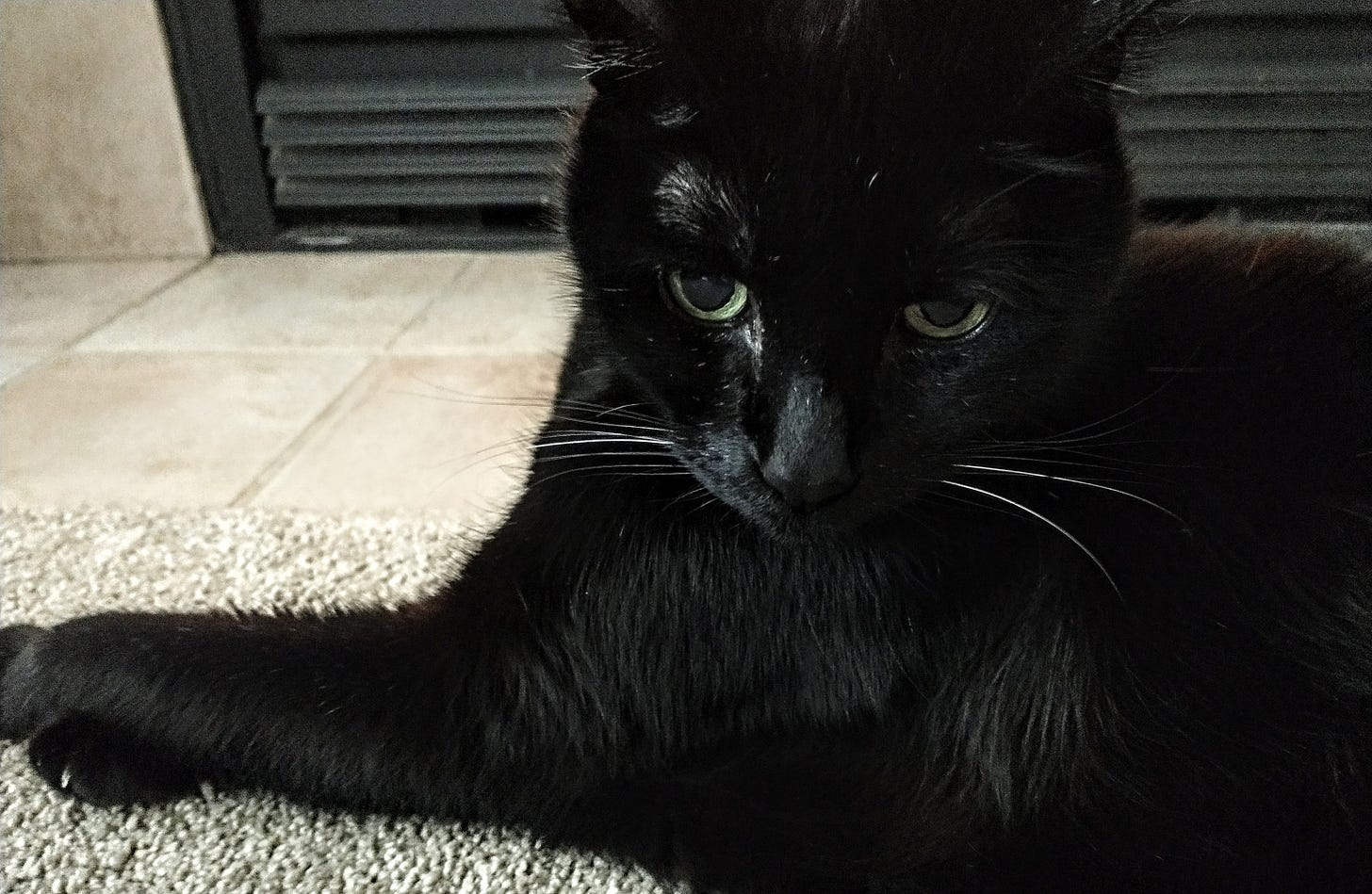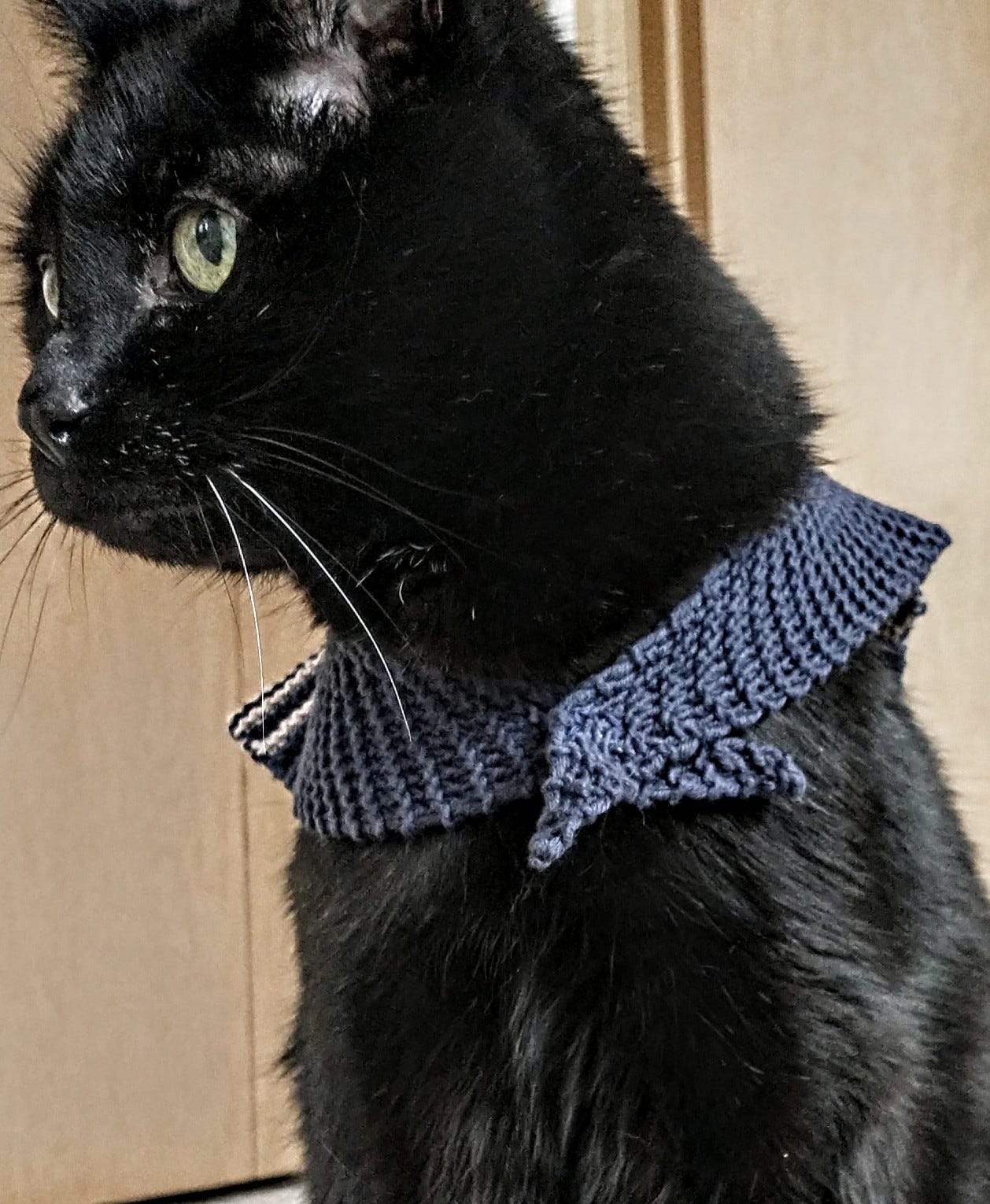Golden years
Living with and loving well all the senior cats
Greetings, you cat-loving peoples,
This issue is a bittersweet one for me, because senior cats are frequently -- selfishly -- on my mind.
My Paul is 16 years old now, and while he shows no serious signs of decline, he's definitely gone through a number of changes, most markedly over the past 4 years.
Some of these changes are physical, but a lot of them are also in his personality and behaviors. Oh, he's still a salty, sarcastic, opinionated dude, as he's been since kittenhood…but he's much slower to move and think than he used to be, even more set in his ways (amazing that's even possible!), and, well, to be honest, less affectionate (and he was never a cuddler). So, because this has been on my mind, I'm willing to bet it's crossed your mind, too -- so welcome to a brief exploration of aging in cats.
Only a few decades ago, vets considered 6 to 8 year old house cats to be seniors. But with improved nutrition and care, it's not uncommon for inside cats to live to be 16 - 20 years old (indoor/outdoor and all outdoor cats have a much lower life expectancy, due to accidents, other animals, and unspeakable human sh!t). So, our cats are living longer than ever!
And with living longer comes a protracted old age. There are a number of normal and/or challenging things that come along with having a senior cat -- but never assume any abrupt change in a cat of any age is just a "normal" aging thing. Quick changes in health or behavior warrant a trip to the vet, stat.
Here are some gradual changes you may start to pick up on as your cat crosses into their golden years:
Losing weight
Senior cats can have a hard time keeping weight on. Make sure, of course, there's no issues with their teeth, thyroid, or kidneys if they start losing weight quickly, but don't be overly alarmed if a formerly chonkoid starts to slim down a bit past 12 or so. If there are no underlying health issues, you can consider adding kitten food to their diet -- it's higher in calories and densely nutritious.
Sometimes, older cats don't find food as appealing because their sense of smell declines. If they can't smell it, they don't wanna eat it. Microwave wet food for 10 seconds to amp up the odor.
Achy joints
Arthritis is pretty common in elder cats, just as in us old folks. It can be painful for them to climb and jump, so installing a low litterbox they can simply step in and out of, and stools/cat stairs that help them up to higher places (like your bed) are really helpful.
Declines in vision and hearing
This you'll see manifest as caution. They pause before them jump up or down or startle if you come up behind them. Nightlights around the house, calling their name as you approach from behind, and avoiding rearranging all your furniture at once can help them with lower vision and hearing.
You may also notice an increase in eye boogers. Clear, black, or dark brown are pretty normal. Green, yellow, or creamy white may signal an eye infection. Use a clean paper towel, wet with warm water, to wipe 'em away.
Needing spa days
With age comes, welp, less flexibility (me too, lil cat, me too). Grooming the hard-to-reach places becomes exhausting. Get a decent brush (human ones are fine) and even some non-toxic wet wipes (the unscented kind for babies are fine) to help your venerated kitty stay clean and gorgeous.
This also includes claws. Older cats tend to scratch less frequently, and that can lead to their claws getting overgrown, and they don't shed the outer sheath of keratin (cat claws grow from the inside out). Make sure to cut your kitty's claws -- and don't be alarmed if there are some brittle layers that seem to crack off when you cut.
More screaming
This is a hard one. There's cognitive decline that's normal, then there's abnormal decline (more on that in a sec). Just like aging people, cats can simply forget why they came into a room. Or get disoriented and confused. Or, they can't quite hear or smell you, and want to know where you are. So, they meow. Often, very loudly. It can be frustrating (especially when you're sound asleep), but calling out gently or getting the cat is very reassuring to them. You'll get old, too, one day. Be patient! Pay forward some karma.
Now, briefly onto abnormal cognitive decline, or feline cognitive dysfunction (FCD). Most cats -- up to 80% by some estimates -- will move into FCD territory by age 18 (which is, like being a human 90 year old). Less than half will exhibit FCD between 11 and 15. If you see any of these behaviors, even in an 18+ cat, consult a vet:
Frequent disorientation and confusion
Inability to complete common tasks (using the litterbox, for example)
Staring in a direction (as in, at a wall) for an extended period of time
Pacing in a circle
Backing into a corner and staying there
Acting fearful when there is no external stimuli
There are a host of factors that can drive FCD, and I really like this article -- it goes lightly into a great many of them, and is worth a read.
I am also aware that this article can inspire worry, especially amongst those of us with senior or middle-aged cats. But it's important to remember that we can create a great environment for our old dudes and dudettes, and that they can have an excellent, albeit slower, quality of life. There's something magical about being there for elder cats that's worth the worry and trouble.
After all, though he's still, as I said, salty AF, Paul enjoys wearing his dignified outfits and posing for photoshoots way more than he ever did as a young buck. And his grey is very, very distinguished.
Isn't it?
As always, we're open to your questions! Keep them coming.
Note: I'm not a medical professional. As always, you know your cat best. Follow your common sense and consult with your veterinarian. If you need low-cost veterinary services, the Humane Society has some options, but you can always call 211 for your area (in the US) to find out about clinics near you.
Love two old folks (Ren and Paul) and one young rogue (Robert)



